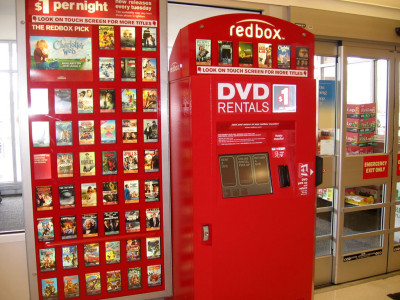If you haven’t had the absurdity of the experience yet, I highly suggest that you visit a Redbox and try renting movies, preferably with a group of people. Redbox was a genius move by McDonald’s to tap the impulse rental DVD market. Even though you need a credit card to use the vending machine, the movies only cost $1 each/night which makes it financially efficacious to rent a movie for you and the other adult and a different movie to plunk the kids down in front of.

I’m not even sure now what we were looking for when we stopped in front of the vending machine, though the fact that we ended up with Paul Blart: Mall Cop and How to Lose Friends & Alienate People is a pretty strong indicator that we settled in our choices. How to Lose Friends & Alienate People seemed like a good alternate, though. After all, it had Simon “Shaun of the Dead” Pegg in the lead and while Kirsten Dunst can be like nails on a chalk board we were all willing to take the gamble.
The fact that this movie about a British writer who is generally a total prick who ends up selling his soul for what he thinks he wants and throwing “it” all away for love who comes to America to work for a slick, entertainment magazine (think the Vogue of the entertainment world) was at turns cringe-worthy, embarrassing, and generally unfunny and predictable isn’t why I’m writing about it. What has me fascinated is how someone in the entertainment world not only becomes a tastemaker but how the tastemakers decide what the tastes should be.
During the course of the film Sidney (Simon Pegg) must interact with, and ultimately ends up selling out to, Eleanor Johnson (Gillian Anderson who I’m convinced has but two modes: stunned and bitch-on-wheels) a publicist for a young, up-and-coming actress, Sophie Maes (Megan Fox) with whom Sidney is just dying to have sex and for a young director, Vincent Lepak (Max Minghella). We’re never told what it is that makes Vincent so special, just that he is special, a visionary even. It’s vitally important that the magazine Sidney writes for do a puff piece, a profile on Vincent to boost his credibility.
Now, I get that in the real world, if anything pertaining to the entertainment industry can be said to be “real,” an agent or a publicist makes a decision to take “talent” on as a client largely based on how easy it will be to sell the talent (and thus secure commission for himself). But what about the total unknown?
Despite how they’re structured, American Idol and Britain’s Got Talent don’t provide much of a window into who is going to be successful and who isn’t. Indeed, if you look at the past winners and runners-up of American Idol you’ll see that in seven years only two winners and one runner up have gone on to big success and the runners-up, generally, have had only moderate success. So it seems that what is popular in the moment isn’t necessarily what’s going to be popular for the long term, and while an agent or a publicist can milk and dump a client, as a long term income strategy that’s pretty stupid.
What I guess puzzles me really isn’t how the people who are in position to be tastemakers make their picks. It could be something as simple as liking the way someone looks in their clothes, or the fact that the talent made the agent, publicist, or producer laugh. I guess what really puzzles me is how tastemakers get to be tastemakers. Who grows up and says “Hey, I want to be an agent so I can foist the next Heidi and Spencer onto an unsuspecting public!” I’m guessing no one, and yet there are dozens, nay hundreds, of people out there feeding the entertainment machine (and aspiring to become food for said machine).
Part of me suspects that it’s some sort of in-joke, something that the rest of us will never get. But I know it’s paranoia to think that somewhere in a curtained off room room with leather banquettes and dark wood running up the walls the elite of Hollywood and beyond gather and cackle as they try to figure out what crap they can sell us next.
I don’t really have any answers but since I’m bent toward figuring out why things are the way they are, or how they operate (which is really just the why of a system), I imagine I’ll be picking at this question – why is what’s popular picked to become popular in the first place – for quite some time.
Leave a Reply